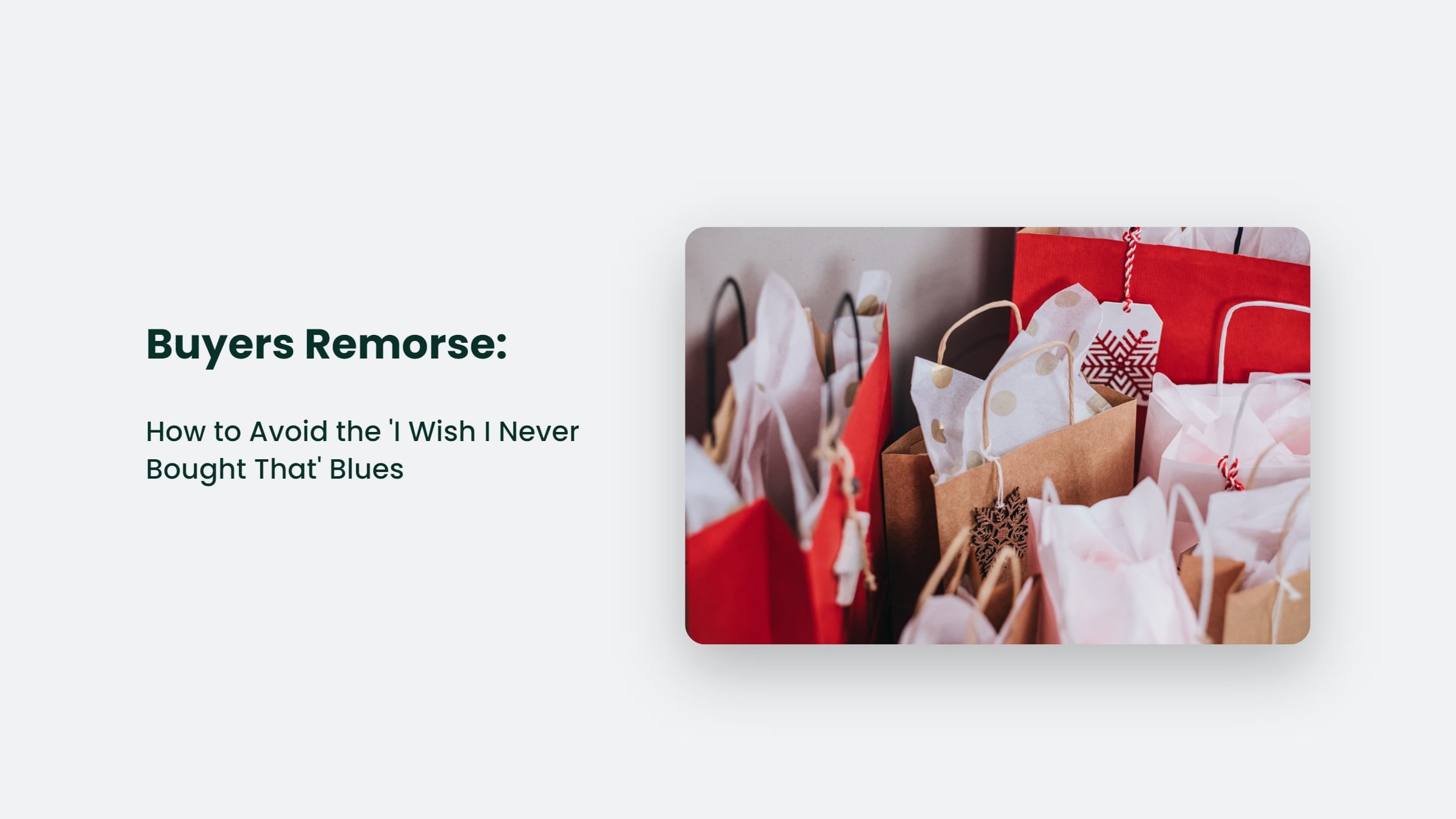

Buyers Remorse: How to Avoid the ‘I Wish I Never Bought That’ Blues

As Seen On
As Australians, we all know the feeling of walking out of a store with a shiny new purchase and feeling on top of the world.
But, as the saying goes, “the joy of buying is often followed by the agony of paying.” And for some of us, that joy can turn into regret, leaving us with a heavy case of buyer’s remorse.
But fear not, dear Aussies, for I am here to give you the lowdown to avoid that sinking feeling in your stomach when you realize you may have overspent on that fancy new gadget or impulse-bought designer handbag.

First things first, let’s define what buyer’s remorse actually is.
It’s that feeling of regret or disappointment after making a purchase, often caused by the realization that the item may not be as useful or valuable as initially thought. It’s like the shopping equivalent of a hangover, minus the fun night out.
I’ve had my fair share of buyer’s remorse experiences. Like when I splurged on a designer dress for a fancy event, only to wear it once and realize it wasn’t my style. Or the time I convinced myself I needed the latest iPhone, only to find out, it was the same as my old one.
But enough about me, let’s talk about you, dear reader. Have you ever found yourself regretting a purchase?
Chances are, you’re not alone. A recent study found that over 60% of Australians have experienced buyer’s remorse at some point. That’s a lot of regrets floating around out there.
So, how can we avoid this pesky feeling? Here are a few tips to keep in mind before making that next big purchase:
- Sleep on it. Impulse buying is one of the biggest culprits of buyer’s remorse. We see something we like, and before we know it, our credit card is out, and the item is ours. But before you hand over your hard-earned cash, try sleeping on it. If you still want the item the next day, chances are it’s a worthwhile purchase. But if the urge to buy has passed, you may have just saved yourself from regret.
- Do your research. Before making a big purchase, do your research. Compare prices, read reviews, and ask for recommendations from friends and family. It will ensure you’re getting the best deal and give you a better idea of whether the item is truly something you need and will use.
- Set a budget. It’s all too easy to get caught up in the excitement of shopping and overspending. To avoid this, set a budget for yourself and stick to it. And if you are tempted to go over budget, ask yourself if the item is truly worth it.
- Consider the long-term. When making a purchase, think about how it will fit into your life in the long term. Will you still want and use this item in six months or a year? If the answer is no, it may be best to pass.
- Trust your gut. Your intuition is often a better indicator of whether something is a good decision than your rational mind. If something feels off about a purchase, trust your gut and don’t do it.
Now, let’s lighten the mood with a little bit of humour.

Do you ever feel like you’re stuck in a never-ending cycle of buyer’s remorse?
Like you’re on a shopping rollercoaster that keeps going round and round, and you can’t seem to get off? Well, you’re not alone, mate. I like to think of buyer’s remorse as the shopping version of a “Groundhog Day” scenario. Do you know where Bill Murray’s character repeatedly relives the same day? Except instead of reliving the same day, you’re reliving the same regret over and over again.
But enough about movies, let’s talk about some real numbers. According to a study by Finder, the average Australian will experience buyer’s remorse at least 5 times in their lifetime, with the most common regrets being clothing (23%), electronics (21%), and home appliances (18%).
But it’s not just the frequency of buyer’s remorse that’s concerning, it’s also the cost. The same study found that the average cost of a regretted purchase was $437, with some individuals reporting regrets of over $1000. That’s a lot of money to be throwing away on regrets.
It’s like that famous quote by Benjamin Franklin, “Beware of little expenses; a small leak will sink a great ship.” Except in this case, that small expense is a purchase you regret, and that small leak might sink your bank account.
But enough about statistics; let’s talk about how we can actually put these tips into practice.
Imagine you’re at the mall and spot a designer handbag you’ve been eyeing for a while. It’s on sale, and it’s a great deal. But before you hand over your credit card, ask yourself the following questions:
- Will I still want and use this handbag in six months?
- Have I done my research and compared prices?
- Is this purchase within my budget?
- Does this purchase align with my long-term goals and values?
- Does my gut tell me this is a good decision?
If the answer to all these questions is yes, go ahead and buy that handbag. But if even one answer is no, it may be best to walk away.
But wait, there’s more! In addition to these tips, here are a few more strategies to help you avoid buyers remorse:
- Make a list before you go shopping. It will help you stay focused on what you need and prevent impulse buying.
- Avoid shopping when you’re emotional. Whether sad, stressed, or excited, your emotions can cloud your judgment and lead to impulse buying.
- Use cash instead of credit. Research has found that people are more likely to regret a purchase when they use credit because it feels less natural than handing over cash.
And now for the fun part, a little quiz to test your buyers’ remorse knowledge:
What is the most common cause of buyer’s remorse?
a) Impulse buying
b) Overthinking a purchase
c) Shopping when emotional
What is the average cost of a regretted purchase?
a) $50
b) $250
c) $437
How many times will the average Australian experience buyer’s remorse in their lifetime?
a) 1
b) 3
c) 5
Answers: 1) a 2) c 3) c
So there you have it, dear Aussies, all the tips and tricks you need to avoid the dreaded feeling of buyer’s remorse. But just in case you still have some burning questions, here’s a quick FAQ:
Frequently Asked Questions
Is buyer’s remorse normal?
Yes, it’s normal to experience regret or disappointment after making a purchase. A study found that over 60% of Australians have experienced buyer’s remorse at some point.
Can I return or exchange an item if I have buyer’s remorse?
It depends on the store’s return policy. Some stores have a strict no-return policy for items that have been used or opened, while others may have a 14-day return policy. Be sure to check the store’s policy before making a purchase.
Is there a way to completely avoid buyer’s remorse?
While avoiding buyer remorse altogether is impossible, following the tips and strategies outlined in this piece can help reduce the likelihood of experiencing it.
The Bottom Line:
In conclusion, buyer’s remorse is an all too common experience for many Australians. Still, by taking a step back before making a purchase, researching, and setting a budget, we can avoid the “I wish I never bought that” blues. Remember, the agony of paying should never follow the joy of buying. Happy shopping, mates!
Casey Jones
Up until working with Casey, we had only had poor to mediocre experiences outsourcing work to agencies. Casey & the team at CJ&CO are the exception to the rule.
Communication was beyond great, his understanding of our vision was phenomenal, and instead of needing babysitting like the other agencies we worked with, he was not only completely dependable but also gave us sound suggestions on how to get better results, at the risk of us not needing him for the initial job we requested (absolute gem).
This has truly been the first time we worked with someone outside of our business that quickly grasped our vision, and that I could completely forget about and would still deliver above expectations.
I honestly can't wait to work in many more projects together!
Disclaimer
*The information this blog provides is for general informational purposes only and is not intended as financial or professional advice. The information may not reflect current developments and may be changed or updated without notice. Any opinions expressed on this blog are the author’s own and do not necessarily reflect the views of the author’s employer or any other organization. You should not act or rely on any information contained in this blog without first seeking the advice of a professional. No representation or warranty, express or implied, is made as to the accuracy or completeness of the information contained in this blog. The author and affiliated parties assume no liability for any errors or omissions.

